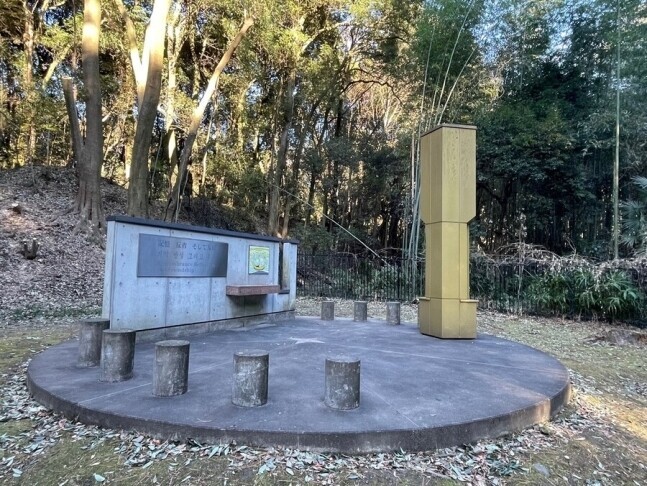hankyoreh
Links to other country sites 다른 나라 사이트 링크
[Editorial] Japan’s removal of forced labor memorial tramples on remembrance, reflection and friendship

In April 2004, Japanese citizens erected a monument in a park in Japan’s Gunma Prefecture to commemorate Korean victims of forced labor mobilization. Engraved on the front were the words, “Remembrance, Reflection and Friendship” in Korean, Japanese and English.
An inscription on the back read, “We profoundly reflect on historical truths that have caused great harm and pain to Koreans, and we express our resolution not to commit such mistakes again.”
This was part of an effort to mourn the Koreans who had died after being forced to work in munition factories and mines during Japan’s colonial occupation and World War II, as well as to reflect on wrongdoings committed during history and to promote friendship between Korea and Japan.
On Monday, the local government initiated procedures to take the memorial down.
After a participant at a 2012 memorial vigil made a reference to the “forced transportation” of Koreans, right-wing groups took issue with what they referred to as a “politicized” event. Government officials sided with this view in disallowing an extension of the memorial’s placement.
Despite efforts by the Japanese public to preserve the monument — including suspending the memorial ceremonies for over a decade — a Japanese court upheld the legality of the discontinuation decision, and Gunma Prefecture issued and began executing an order to remove it on that basis.
A contributing factor here was the rightward shift in Japan, which intensified under the leadership of Shinzo Abe in the early 2010s. It is impossible to shake the fear that Gunma Prefecture’s choice to remove this monument — violently uprooting the fruits of the public’s efforts to reflect on the lessons of history and pursue a future for Korea and Japan — will mark the opening salvo for threats and destruction to other monuments to Korean forced mobilization victims in different regions of Japan.
There is a ray of hope in all this with the ongoing efforts by Japanese society to oppose the monument’s removal. Japanese activists rallied around the monument to protest its removal, with some camping out overnight. Over 4,300 artists from across the country signed a petition in opposition to the monument’s removal that they then submitted to the prefectural government.
In an editorial published on Tuesday, Japan’s Asahi Shimbun wrote, “In an era where there is a growing trend to glorify pre-war Japan, if the prefecture, having received protests from certain groups, has fallen into a ‘don’t-rock-the-boat’ mentality under the guise of political neutrality, the local government’s stance could effectively provide support to historical revisionism,” and called the current circumstances “extremely dangerous.”
The prefectural government of Gunma should stop this shameful and dangerous act and take time to listen to the moral sense of the Japanese public.
But what’s most frustrating is the attitude assumed by our own government in Korea. The only response by the Ministry of Foreign Affairs here has been a statement reading, “We hope that this may be resolved in a way that does not impede friendly relations between our two countries.” Meanwhile, the Yoon Suk-yeol administration is responding with stone-cold indifference after it gave Japanese corporations complicit in the forced mobilization of Korean laborers a free pass with its third-party compensation plan for victims.
At a time when Japan’s rightward shift is inhibiting genuine friendship and cooperation between Korea and Japan, Seoul must make its voice heard in Tokyo. But as of now, the Yoon administration appears to feel not so much as a twinge of shame that it’s left the matter in the hands of citizens of both countries who are fighting to keep the monument in place.
Please direct questions or comments to [english@hani.co.kr]

Editorial・opinion
![[Correspondent’s column] The real reason the US is worried about Chinese ‘overcapacity’ [Correspondent’s column] The real reason the US is worried about Chinese ‘overcapacity’](https://flexible.img.hani.co.kr/flexible/normal/500/300/imgdb/original/2024/0510/5217153290112576.jpg) [Correspondent’s column] The real reason the US is worried about Chinese ‘overcapacity’
[Correspondent’s column] The real reason the US is worried about Chinese ‘overcapacity’![[Editorial] Yoon’s gesture at communication only highlights his reluctance to change [Editorial] Yoon’s gesture at communication only highlights his reluctance to change](https://flexible.img.hani.co.kr/flexible/normal/500/300/imgdb/original/2024/0510/7717153284590168.jpg) [Editorial] Yoon’s gesture at communication only highlights his reluctance to change
[Editorial] Yoon’s gesture at communication only highlights his reluctance to change- [Editorial] Perilous stakes of Trump’s rhetoric around US troop pullout from Korea
- [Guest essay] Preventing Korean Peninsula from becoming front line of new cold war
- [Column] The state is back — but is it in business?
- [Column] Life on our Trisolaris
- [Editorial] Penalties for airing allegations against Korea’s first lady endanger free press
- [Editorial] Yoon must halt procurement of SM-3 interceptor missiles
- [Guest essay] Maybe Korea’s rapid population decline is an opportunity, not a crisis
- [Column] Can Yoon steer diplomacy with Russia, China back on track?
Most viewed articles
- 1Korea likely to shave off 1 trillion won from Indonesia’s KF-21 contribution price tag
- 2Nuclear South Korea? The hidden implication of hints at US troop withdrawal
- 3[Editorial] Perilous stakes of Trump’s rhetoric around US troop pullout from Korea
- 4With Naver’s inside director at Line gone, buyout negotiations appear to be well underway
- 5In Yoon’s Korea, a government ‘of, by and for prosecutors,’ says civic group
- 6[Column] ‘Choson’: Is it time we start referring to N. Korea in its own terms?
- 7‘Free Palestine!’: Anti-war protest wave comes to Korean campuses
- 8How many more children like Hind Rajab must die by Israel’s hand?
- 9Overseeing ‘super-large’ rocket drill, Kim Jong-un calls for bolstered war deterrence
- 10[Photo] ‘End the genocide in Gaza’: Students in Korea join global anti-war protest wave